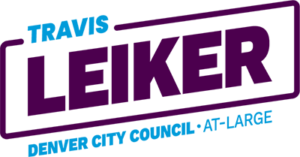ROADMAP TO GET DENVER BACK ON TRACK
After traveling throughout the city and conducting numerous conversations with community leaders, I have outlined my 8-point action plan to get Denver back on track.
I believe the At-Large City Council seats are uniquely positioned to build consensus across district boundaries, provide constituent services support to district offices, and interface closely with the executive branch to bring citywide solutions to the most challenging issues of the day. Denver will soon elect a new Mayor and at least five new City Council members. This provides an opportunity to hit the reset button on the Mayor-Council relationship and build consensus between the executive and legislative branches of city government.
The 2023 election is the most consequential in 40 years. My policy platform will bring real solutions to the table and demonstrate that I am the leader Denver needs on City Council and in the At-Large role.
Denver’s cost of living is on the rise, and the rapid spike in housing costs places a heavy burden on Denver residents. Through smart zoning and land use, transit-oriented development and effective urban design, and improved city processes, I believe we can better achieve Denver’s near-term and long-term housing needs.
Here’s how:
- Strengthen the AHRT (Affordable Housing Review Team) program to ensure that exclusively affordable housing developments receive expedited city review.
- Facilitate speedier approval for projects aimed at delivering housing; work closely with the executive branch to provide legislative support that will improve customer service and refine internal processes across city agencies.
- Preserve existing affordable housing units that will lose their affordability over the next 5-10 years.
- Add to Denver’s land bank and utilize investment strategies like land trusts to bring down costs of real estate; work with public, private, and philanthropic partners to onboard more affordable housing.
- Support the waiver of city sales and use tax on materials used to build 100% affordable housing developments.
- Leverage historic properties as opportunities for new housing; promote and encourage adaptive reuse to provide significantly affordable and supportive housing.
- Implement city grants and stipends for improvements to older properties and help contain costs.
- Finally, deepen city partnerships with Denver Housing Authority (DHA) and Colorado Housing Finance Authority (CHFA) to increase housing assistance programs for income qualified renters and first-time homebuyers; expand rental assistance programs to reduce evictions for Denverites living on lower incomes.
The number of people experiencing homelessness in Denver has nearly doubled in two years. Tensions are rising in response to unsanctioned encampments and growing neighborhood frustrations. This is unacceptable. Homelessness is a city-wide issue, and it requires a coordinated, city-wide response informed by data, best practice, and better management.
Here’s how:
- Adopt Community Solutions’ Built for Zero model to end homelessness. Identifying each unhoused person by name and understanding their circumstances will help the city and service providers deliver resources in a targeted, strategic way.
- Work collaboratively with regional partners to build more housing with wrap-around services such as health care clinics, job placement programming, housing support etc. Denver cannot go it alone, and I am committed to building regional partnerships to get this right.
- Strengthen the city’s contracted services and use of on-the-ground experts to implement the full scope of housing services; I will be looking for nimble organizations that can deploy city resources swiftly and across the full scope of the support continuum.
- Invest in creative approaches such as tiny home villages, where they make sense, to aid unhoused residents, couples, families, and those with pets.
- Expand Denver’s Support Team Assisted Response (STAR) program which deploys emergency response teams to individuals in crisis, and invest in more neighborhood-based services in all corners of the city.
Denver’s quality of life is rooted in its neighborhoods, reflecting a rich diversity of people and unique community characteristics. We need to invest in Denver’s future generations and their families, including promoting equal access to essential city assets like parks, recreation centers, and libraries as well as untapped opportunities. All Denverites should have access to clean air, safe drinking water, multi-modal transit options, green spaces, health care, and nutritious food. Our arts and cultural facilities are world renowned, and they are essential to our success.
Here’s how:
- Invest more in parks and open spaces, including the preservation and enhancement of tree lawns; provide access to the arts, libraries and culture; expand high-quality, affordable health care and food security.
- Actively support and pursue increased funding for safety net health care providers like Denver Health and other organizations.
- Promote equitable distribution of city resources; work to deploy city resources in neighborhoods that have faced inequities for far too long.
- Leverage social impact bonds to bring additional resources into neighborhoods.
- Work to expand car sharing programs, public transit systems, and adopt a curated, Denver-specific bus route system in partnership with RTD.
- Make it easier for the adaptive reuse of historic structures to meet contemporary needs and reduce waste.
- Upgrade local infrastructure and support adaptive reuse initiatives to reduce our carbon footprint and expedite neighborhood revitalization.
- Tackle climate change with renewed support for composting, recycling, and other climate friendly measures to curb our carbon footprint.
- Deliver city essentials such as filling potholes, enhancing sidewalk infrastructure, and neighborhood developments in an energy efficient and environmentally sustainable way.
- Work closely with Xcel Energy, Energize Denver, and environmental groups to explore new opportunities to combat climate change.
Sadly, Denver is poised to surpass the record number of homicides set nearly 40 years ago. At the same time, our public safety agencies and first responders are facing an unprecedented workforce shortage. We can tackle crime through smarter policing strategies, more training, innovative staffing, and building a better relationship between law enforcement and the community.
Here’s how:
- Support new, centralized training facilities for first responders including police, sheriff, firefighters, 911 operations, and other first responders; evidence shows that interagency training is more effective and such models are being adopted by peer cities.
- Call for and financially support a nationwide, comprehensive recruitment plan to ensure sufficient staffing across all safety agencies.
- Work with the Department of Public Safety to set new goals in equity hiring, prioritizing new public safety leaders from historically underrepresented populations including race, ethnicity, gender, and sexual orientation.
- Prioritize more education and training across law enforcement leadership; institute more training in the areas of implicit bias and anti-discrimination ranging from transgender awareness to racial implicit biases.
- Dedicate resources to effective policing strategies such as increasing the number of unarmed officers along commercial corridors and directing more resources to STAR (the co-responder program); ensure that law enforcement and licensed, qualified mental health professionals work collaboratively and responsibly.
- Initiate new and proven crime prevention measures such as community policing and neighborhood engagement, and expand focused deterrence programming.
- Dedicate more time and resources within the public, and private, sectors to promote crime prevention through environmental design.
Internal operations at City and County of Denver have become backlogged and stagnated, making interactions between residents, small business owners, nonprofit leaders, and city staff challenging. I am committed to recruiting and retaining top-talent and fostering innovative leadership through the legislative and budgetary powers entrusted in council.
Here’s how:
- Support the expansion of Denver 311 and PocketGov to a 24/7/365 operation to allow for better customer service and support.
- Support best-value contracting for all city contracts with an eye on higher wages and benefits, local employment opportunity, and talent recruitment and retention.
- Ensure Denver receives high quality work and outsourced services are completed on schedule and on budget.
- Explore and actively pursue new contracting opportunities to ensure city resources have the capacity to impact other vendors and servicers within the City.
- Call for civility and decorum across all levels of the city, including from council dais and chambers.
It is time to put Denver ahead of political self-interest. Denver is leading the way by implementing the Fair Elections Fund, voting by mail, and improving accessibility. However, we need to modernize and reform local government to respond to Denver’s shifting needs and further our shared goals. We must increase participation and design an electoral process that gives way to new leadership and cultivates a fresh perspective.
Here’s how:
- Initiate new term limits calling for two, consecutive 4-year terms for all city-wide offices—including Mayor, Auditor, Clerk and Recorder, and Denver City Council.
- Evaluate the elections calendar to ensure citizen participation remains front and center; invest more in the Clerk and Recorder Office to support oversight and success of elections, implement the Fair Elections Fund Program, and make voting even more accessible in all corners of the City and County of Denver.
- Modify ordinances governing city supported organizations, including BIDs, GIDs and RNOs.; call for greater accountability and reporting metrics as part of these administrative processes.
- Support more training to increase citizen participation and support outreach needs in historically marginalized neighborhoods.
- Hire and support community organizers who are trusted outreach specialists and subject matter experts; these individuals will be tasked with sharing information, garnering feedback, and communicating specific issues that impact neighborhoods.
The job market continues to grow, but the pandemic has caused us to reevaluate how to support Denver’s workforce and sustain economic growth. Boarded up windows, graffiti at vacant properties, and delays within the City are hurting small business and neighborhood vitality. I am excited to partner with the next mayor and other city leaders to attract good, secure, and high paying jobs. We must support our small businesses–including women, BIPOC, LGBTQ+, and other minority owned businesses–to simulate more economic growth and to create intergenerational wealth and financial stability.
Here’s how:
- Work with stakeholders to identify new ways to support local, small businesses through government contracting and neighborhood input.
- Convene minority and women owned developers, architects, and lenders to help promote economic development in underserved and historically marginalized communities; activate and support communities of color.
- Partner with the Office of Economic Development and others to ensure we are investing in neighborhoods with the greatest potential and/or need.
- Make certain that our state and federal legislative leaders have a willing partner in calls for more investments in City and County assets including tourism, cultural facilities, parks, and other public spaces.
- Continue to promote the smart allocation of ARPA funds and other federal resources; identify ways to sustain those programs to ensure their long term sustainability and viability.
-
Hire and support community organizers who are trusted outreach specialists and subject matter experts; these individuals will be tasked with sharing information, garnering feedback, and communicating specific issues that impact neighborhoods.
Bureaucratic infighting and social media grandstanding has reached new levels causing unfortunate levels of inertia. We need more leaders on council with management experience and keen understanding of complex organizations–-including recruiting and retaining top talent and driving policy outcomes and organizational action. By taking an all-hands-on deck approach, we can get big projects done on time in the most economically efficient way.
Here’s how:
- Call for an end to tweeting and other social media interaction by council members during public meetings to restore transparency and ensure all members are focused on the matters at hand.
- Work with the next Mayor to ensure the successful completion of the Great Hall project at Denver International Airport and the 16th Street Mall enhancements.
- See to it that the Colorado Convention Center, National Western Center, and Denver Arts Complex get the much needed upgrades to further cement our role as a world class city.
- No financial support to establish new departments that may have unintended consequences like creating unnecessary redundancies or added bureaucracy.


